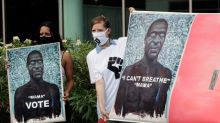Facing blame for virus, Asian-Americans fight back
These volunteers are sending a message that crime and bullying will not be tolerated in San Francisco’s Chinatown.
The patrol - dubbed ‘United Peace Corps’ - is one of many groups nationwide fighting back against harassment of Asian-Americans since the pandemic's emergence in China.
Founder Leanna Louie says in eight weeks, her group has filed 24 incident reports.
"It is upsetting to hear about the things that go on in the stores, the people shoplifting, beating people up, mugging, road rage, all these things that happen that are targeted towards Asians and particularly here in Chinatown. It's happened quite often and there's been videos of it. It really needs to be stopped..."
Earlier this month - a surveillance camera in Seattle caught a man shoving an Asian man and slapping at his face mask.
Since Mid-March, over 1,800 coronavirus discrimination cases been reported nationwide through 'Stop AAPI Hate’ - a website that monitors anti-Asian American Pacific Islander hate crimes.
And some activists fear harassment could worsen in a U.S. election year.. with critics blasting President Donald Trump for publicly referring to the coronavirus as the:(TRUMP) "Chinese Virus"
And blaming China for the virus spreading all over the world.
(TRUMP) "The world is now suffering as a result of the malfeasance of the Chinese government."
Neighborhood watch volunteer in New York’s Chinatown, Dallas Short, says that kind of rhetoric can have a ripple effect:
"I think it's stupid. I think it goes from like leadership down, so people are just drinking the Kool-Aid too much and they've got to realize we're all in this together, everyone is dying, it doesn't care what race you are, doesn't care about your age, doesn't care about your gender, your sexual preference, anything. So we just gotta take care of each other, because if we don't, who else will?”
Recently - Virtual anti-hate rallies and hashtag movements - such as #HATEISAVIRUS - have sprung up as a means of fighting back.
Adam Manhbaoboua founded a Facebook group called ‘'STOP RACISM AGAINST ASIAN AMERICANS - 1 MILLION STRONG’
"Racism is wrong, it should never be accepted, it should never be tolerated. And this whole health crisis is starting to become this human rights crisis.” (flash)"We've got to show strength.”
And that’s exactly what they are trying to do - harnessing the power of social media and patrol groups - to change the narrative.
































